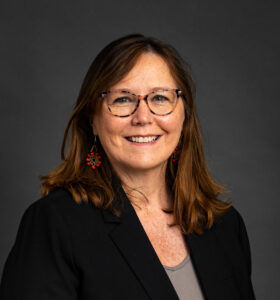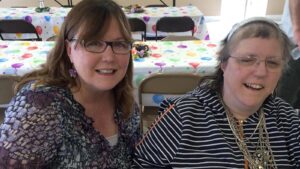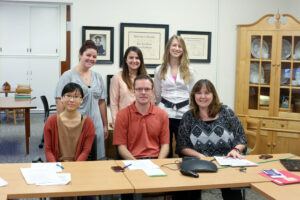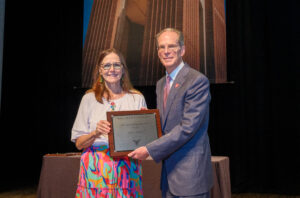To say Dr. Lisa Ruble is accomplished would be an understatement. She has been relentlessly pursuing interventions for individuals with autism for over thirty years and has seen drastic changes in that time. Initially working in microbiology after

Dr. Lisa Ruble, Earl F. Smith Distiguished Professor in Special Education and Autism
completing her bachelor’s degree at Indiana University, Lisa transitioned to a clinician role as a school psychologist following her master’s program at Purdue University. This is where she was drawn to individuals with autism and wanted to correct the misunderstandings surrounding the diagnosis. Lisa’s research has done just that as the understanding of and research about autism grows—much of which Lisa has contributed to. While at the time of her sister Leslie’s autism identification, only 1 in 10,000 individuals with autism received such a clear diagnosis, we now more accurately understand that autism could impact up to 1 in 31 individuals, and intervening with individuals with autism allows for providers and care teams to better support this population.

Lisa, on the left, with her sister, Leslie
Her path to focusing on autism interventions began with her work as a clinician. This role allowed Lisa to provide outreach and education for parents and individuals with autism. By 2005 when she received a grant from the National Institutes of Health (NIH) she was able to shift her focus from pediatric psychology to education, allowing her to devote more time to research. This move to education allowed her to dig into the research and methodologies surrounding autism interventions and to work with the next generation of providers
2005 wouldn’t be the last time that Lisa worked with NIH, though. She has continued to pursue externally funded research projects and, to date, has secured four NIH grants, in addition to obtaining just shy of two million dollars in grant funds from the Institute of Education Sciences (IES) in 2023. Pursuing grant funding is a large undertaking, but it’s something that Lisa finds to be worthwhile. “It allows me to push the envelope of what’s possible,” Ruble shared. Investing in research, along with collaborating with students and colleagues, are what she enjoys most about working in higher education.
Her non-linear path from microbiology to higher education and research has helped her observe the field from a unique perspective. She has seen from her days as a school psychologist that there is a lack of research being done in public schools. “Schools are the one place that children with autism can receive assistance,” Lisa says. Conducting her research and implementing intervention programs in schools pushes past the inequities that can be present in private intervention programs.
It’s through these externally funded public intervention programs that Lisa has seen a great deal of progress for individuals with autism. External funding, like that from NIH and IES, allows for larger scale research where she can readily incentivize participants in a more tightly controlled research environment. Lisa has utilized this funding in part to develop the Collaborative Model for Promoting Competence and Success (COMPASS) and COMPASS Across Settings (CAST). These intervention programs provide “an alternative framework for improving the quality of services and outcomes for children, youth, and adults with autism spectrum disorder,” according to the COMPASS website.

Lisa with one of her previous research teams
Working in tandem with and informing a child’s Individualized Education Plan (IEP), COMPASS brings the child’s team of caregivers and teachers together to focus on self-management, social skills, and education skills. COMPASS is one of few programs that are even related to a child’s IEP, bringing balance to the child’s care plan. Lisa hasn’t just seen the gap between autism interventions and IEP for students, though. With CAST, Lisa and her team of 11 lead investigators and researchers are able to bridge those gaps with CAST during the transition from K-12 education to adulthood.

Dr. Lisa Ruble receives the 2025 Outstanding Research Award from Ball State President Geoffrey Mearns
It is due to groundbreaking work like this that in August 2025, Dr. Ruble was honored with Ball State University’s Outstanding Research Award. Her colleagues, who say that her scholarship has transformed and improved the lives of individuals with autism and their families, kept the nomination a secret from her. In speaking with her via Zoom in the weeks following the award, she said it was a “very humbling” experience to be recognized in this way by her peers. At times, she revealed, she can wonder if the time and energy she has dedicated to the field is impacting the field in a meaningful way, and recognition from colleagues in this way shows her that others recognize and appreciate the work she is doing.
Going forward, Lisa has high hopes for the future of her research agenda. She aims to be able to expand COMPASS by training clinicians to implement the intervention and compare the quality of engagement in treatment sessions with the children’s outcomes. Her work with schools won’t be coming to an end, though. She additionally aspires to secure funding to train school administrators on how to support school-based autism trainers and teachers that are implementing innovative practices, like COMPASS, and how to determine if they’ll choose to sustain those programs in the future. Furthermore, Candlelight, a program she is working on that is currently under review, will work with 20,000 families in northern California and Hawaii to improve treatment sessions and the quality of engagement in those sessions after a child is referred to an Applied Behavior Analysis clinic following an autism diagnosis. Finally, Lisa hopes to expand the implementation of COMPASS from 10 to at least 30 schools, as well as increase caregiver advocacy skills.
Lisa is currently the Earl F. Smith Distinguished Professor in Special Education and Autism and has published more than 70 peer-reviewed research papers, books, and book chapters. Outside the classroom, Lisa channels her creativity into painting animals, including her own pets. The Office of Research is thrilled to recognize Lisa’s scholarly achievements at this year’s BeneFacta.
